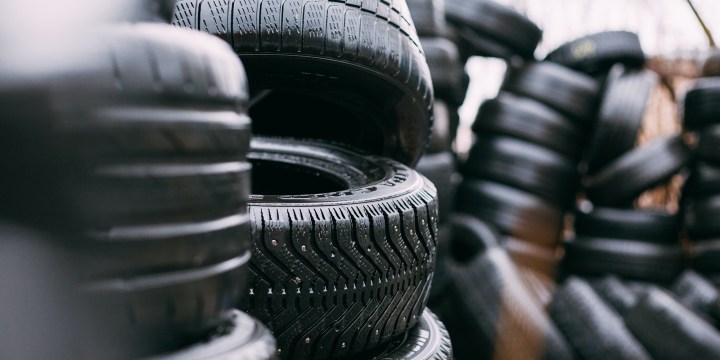EXTRA DUTIES
New import tariffs — pushing up tyre prices or saving local jobs?

Tyre manufacturers are at loggerheads over new import tariffs, which some say will make the cost of tyres untenable, while others say it’s a necessary part of anti-dumping measures.
The new import tariff of 38.33% on Chinese tyres will push overall duties on tyres close to 70%, making tyres about 25% more expensive for passenger cars and 22% to 23% more costly for taxi, bus and truck owners.
The provisional duties are effective immediately and will be in place for six months until 8 March 2023. Local manufacturers of tyres — Continental, Bridgestone, Goodyear and Sumitomo, collectively known as the South African Tyre Manufacturers Conference (SATMC) — applied to the International Trade Administration Commission (ITAC) for the imposition of substantial additional duties on passenger, taxi, bus and truck vehicle tyres imported from China.
SATMC members say the additional duties are necessary to prevent the dumping of Chinese products and to protect local jobs. SATMC employs 6,000 direct workers and supports 19,000 indirect jobs.
SATMC’s managing executive, Nduduzo Chala, explains that SATMC had applied to the ITAC for an anti-dumping investigation on the basis that tyres imported from China at unfairly low prices are causing material injury to the local industry.
The investigation kicked off in January this year, and the six-month tariffs imposed last week follow the preliminary investigation process. ITAC is expected to issue a preliminary report followed by a final investigation. Its final determination must be published by the end of July next year.
Call to reverse decision
However, the Tyre Importers Association of South Africa (TIASA) counters that the new higher tariffs will materially affect the cost of transport, food and goods — and therefore general inflation — and has called for the immediate reversal of this decision.
TIASA members, all of which are South African wholesale companies — many have been in business for two or three generations — employ a collective 3,000 people directly, and support at least 55% of those 19,000 indirect jobs claimed by SATMC.
Charl de Villiers, chairperson of TIASA, says it is difficult to understand the announcement at a time when Parliament is debating the introduction of an economic relief package to help South Africans survive the rising cost of living and rampant inflation.
Visit Daily Maverick’s home page for more news, analysis and investigations
Stats SA’s latest consumer inflation figures show that annual consumer inflation recently reached a 13-year high, increasing to 7.8% in July, from 7.4% in June. While wages have remained relatively constant over the past year, the cost of living has increased sharply.
The average food basket, according to the Pietermaritzburg Economic Justice and Dignity Group, increased by 12.6% between August 2021 and August 2022, and Eskom’s tariff increase for 2022 was at 9.61%.
The cost of transport has also increased significantly. According to Stats SA, those using public transport saw a 9% increase in July, pushing the annual increase to 16.4%.
While there is some good news for commuters and the transport and logistics sector with this month’s drop in the petrol price, the imposition of provisional duties on tyres imported from China will negate this relief, driving up the price of all tyres.
Knock-on effect
Since tyres are the third biggest input cost in transport, after wages and fuel, these new duties will have a knock-on effect on the price of goods and specifically food.
“These increases will be extremely difficult for financially constrained consumers given the current inflationary climate. The unfortunate consequence is that people will either delay replacing their tyres or trade down to illegally regrooved tyres, both exceptionally dangerous outcomes, especially heading into the December holiday season.
“Government’s rationale for the imposition of duties is ostensibly to help protect local manufacturers, but in the case of tyres, the local manufacturers themselves are having to import the vast majority (80%) of the more than 3,000 different models of tyre ranges they sell.
“They have to do this because it is not cost effective to set up production lines for that many models within one plant,” says De Villiers.
De Villiers says there is precedent for the government making bold decisions such as absorbing some of the increases in the fuel levy earlier this year.
“Similarly, in August, the Minister of Trade, Industry and Competition decided, in the public interest, to suspend the imposition of anti-dumping duties on imported chicken.
“While the large corporates may not like this, (these decisions) do benefit the vast majority of the population, who need financial relief now more than ever.” BM/DM

















Seems like the middle class and poor are being obliterated with increases across the board.
This is the right debate, but the article fails to adequately make the case for local manufacturing as a jobs creator, whose employees are then local consumers whose purchasers drive the market. Every business wants to reduce their costs by employing less people, or paying them less or buying cheap imports and relying on other sectors to create ‘financially enabled consumers’ to buy their goods. Its up to the State to impose a balance between local manufacturing priced in rands so our people having decent jobs and income and permitting importing of those goods where we don’t have the local materials to produce these here. This balance has been missing for decades which is why we have 40% + unemployment and an increasingly unstable society.
We know the only thing at issue here is profit. All else is lies. We know lies when we hear them; we hear them every day, all day.
It’s all about protecting profit and Government is in favour because they make money out of it too. Protectionist policies lead to ever decreasing levels of efficiency. Making the majority of the population pay more to allegedly save a small amount of jobs in just plain idiotic. Why should the rich countries enjoy products for far less than we pay ? They don’t have to pay 45% import duty on clothing, or 70% on tyres. We pay 30% import duty on ceramic mugs which aren’t even manufactured in SA. I challenge those who think protectionism is the answer to broaden their thinking.